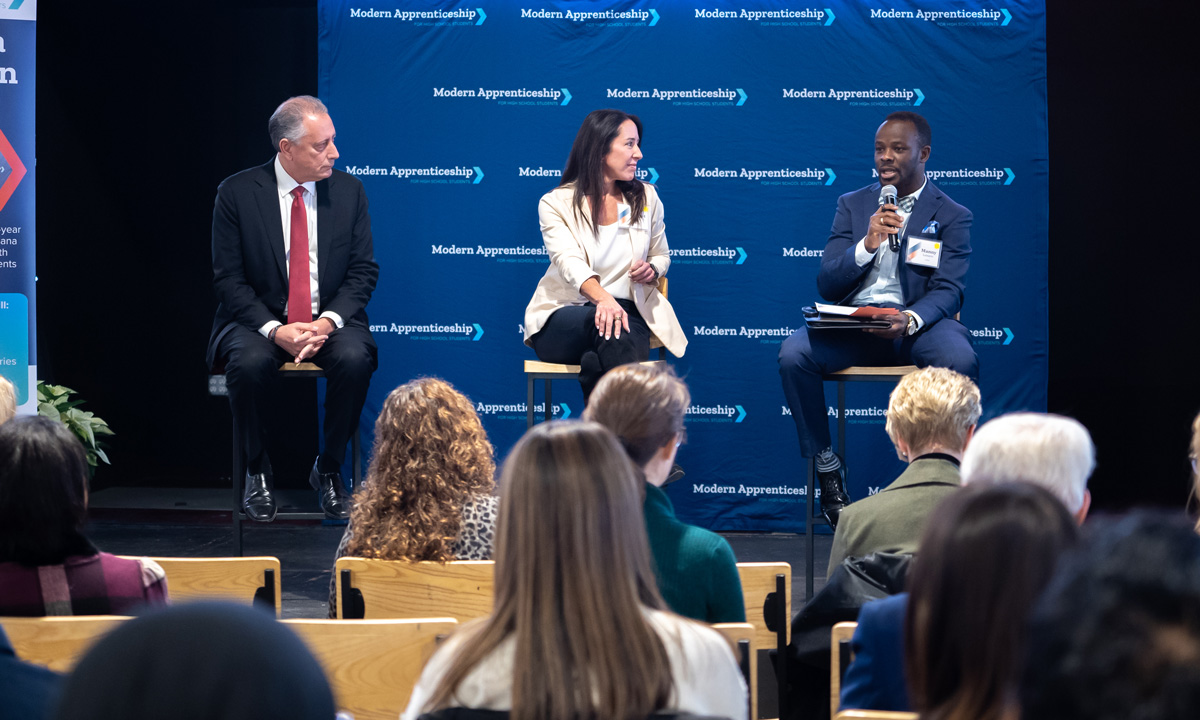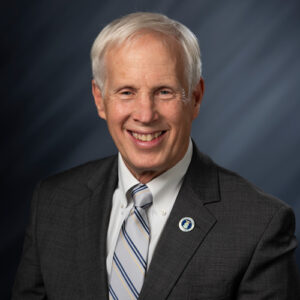Indiana Expands Work-Based Learning, Apprenticeships, Internships to HS Students
Behning: While not every HS grad needs to attend college, nearly everyone entering the workforce needs some training or certification beyond a diploma

Get stories like this delivered straight to your inbox. Sign up for The 74 Newsletter
Until recently, Indiana has focused a majority of its efforts into skilling up the workforce primarily by helping Hoosiers who are underemployed earn the credentials needed to move up in their career. Now, the state is expanding its focus to students, many of whom have not entered the workforce. Because while not every high school graduate needs to attend college, nearly everyone entering the workforce today needs some form of additional training or certification beyond a high school diploma.
The Indiana Commission for Higher Education’s most recent College Readiness Report shows the number of Hoosiers pursuing a college degree or workforce certification fell from 65% in 2015 to 53% in 2020. In March 2021, the U.S. economy added 916,000 jobs, but the Bureau of Labor Statistics reported less than 1% of those jobs were for workers with only a high school diploma. In a post-pandemic economy, this massive job growth indicates the kind of employees job creators are looking for moving forward. Unfortunately, this means nearly half of Indiana’s high school graduates are competing for an extremely small pool of new jobs.
To help address this challenge, Indiana expanded work-based learning, apprenticeship and internship opportunities for high school students this year by creating Career Scholarship Accounts. These accounts are available to every student beginning in their sophomore year of high school. Students participating in qualifying programs can apply for $5,000 each year to pay for career training courses, enroll in earn-and-learn opportunities and cover the costs of items like transportation to and from work sites, uniforms, tools and certification exams. The goal is to have 1,000 students participating throughout the 2023-24 school year.
To ensure these opportunities are widely available, schools and local businesses are encouraged to partner up, so students can take classes and participate in internships and apprenticeships throughout the day. For example, a student could take traditional classes in the morning and then intern at a local business in the afternoon, learning skills like welding, construction or nursing. Participants will graduate not only with a high school diploma, but with a workforce certification.
Indiana is not starting from scratch when it comes to developing partnerships and providing high schoolers with these opportunities. Similar earn-and-learn programs have already been implemented throughout the state with great success.
Ascend Indiana connects job seekers to open positions and makes available resources on how to apply for a job or internship. In Indianapolis, EmployIndy partners with local schools, Ivy Tech Community College, the mayor’s office and nonprofit organizations to provide career services to individuals aged 16 to 24. Through EmployIndy, students can participate in paid, hands-on apprenticeships that complement schoolwork, such as junior coder, IT support tech and medical assistant. The Horizon Education Alliance in northern Indiana connects high school students to opportunities to earn college credit and industry-recognized credentials, and gain real-world experience before graduation through work-based learning programs.
These organizations and others are instrumental in preparing Hoosiers for the workforce, and Career Scholarship Accounts will increase the number of students able to jump-start their career. The Indiana Commission for Higher Education will vet and approve the businesses and career centers providing these opportunities.
Many students are not on the best path to earn the correct degree for their chosen career. The law that created the accounts also calls for high school juniors and seniors, and most college freshmen, to meet with an employer, labor organization or similar entity for 30 minutes to discuss their career goals and understand the education level necessary to achieve them. This is one of the most impactful parts of this law because these meetings not only provide invaluable career advice, but they help young adults make meaningful connections and begin to grow their professional network.
To help students fulfill the meeting requirement, the law establishes a comprehensive career navigation and coaching system through the Indiana Commission for Higher Education. Traditional public and charter high schools must also host at least one career fair each year.
In a larger effort to make high school more relevant, the Indiana Department of Education recently outlined a plan to “rethink the high school experience.” It focuses on three key areas: making high school diploma requirements more flexible and relevant to students, employers and communities; improving access to high-quality work-based learning opportunities; and increasing access to high-value postsecondary credentials. These combined efforts will help better prepare students to confidently choose a career and apply for a job.
Indiana’s efforts to skill up and prepare Hoosiers for high-paying, in-demand jobs is critical to keeping the state’s economy on the right track. Expanding the state’s focus to support high school students will help young adults begin their postsecondary career ahead of the curve and prepared to fill these open job positions.
Get stories like these delivered straight to your inbox. Sign up for The 74 Newsletter

;)
